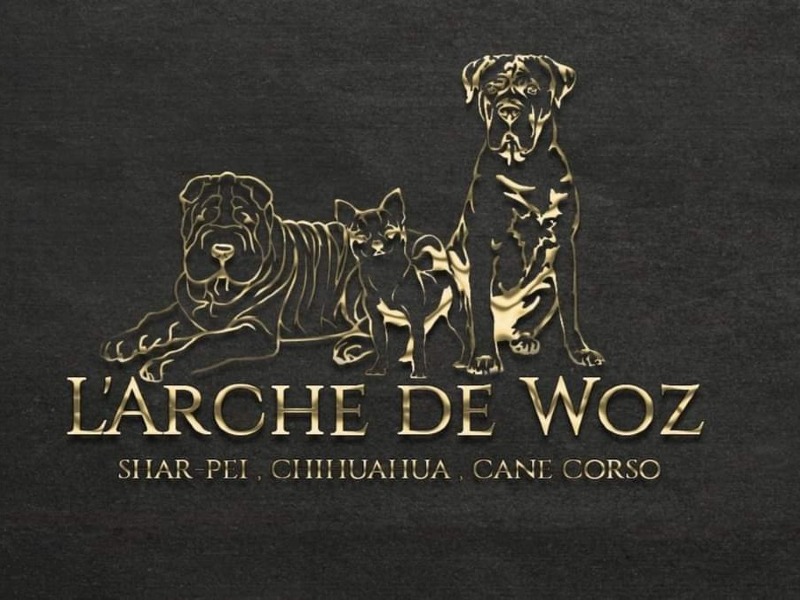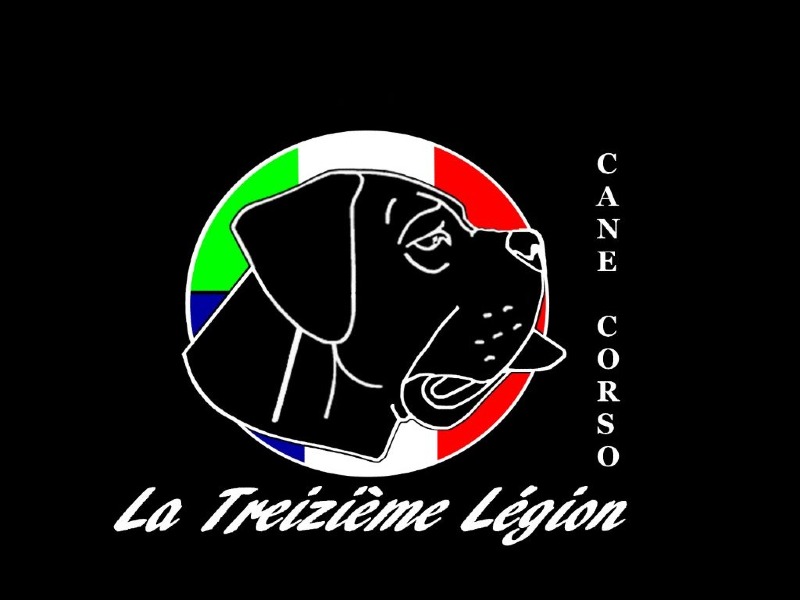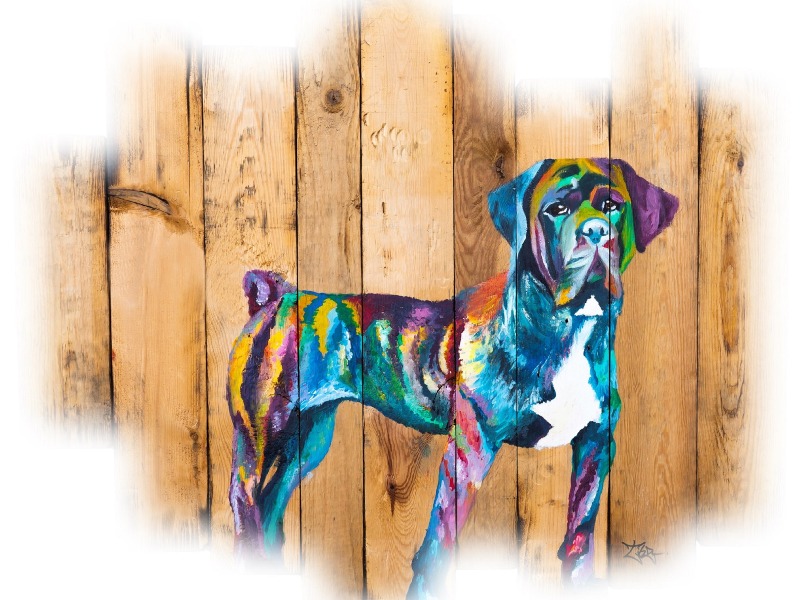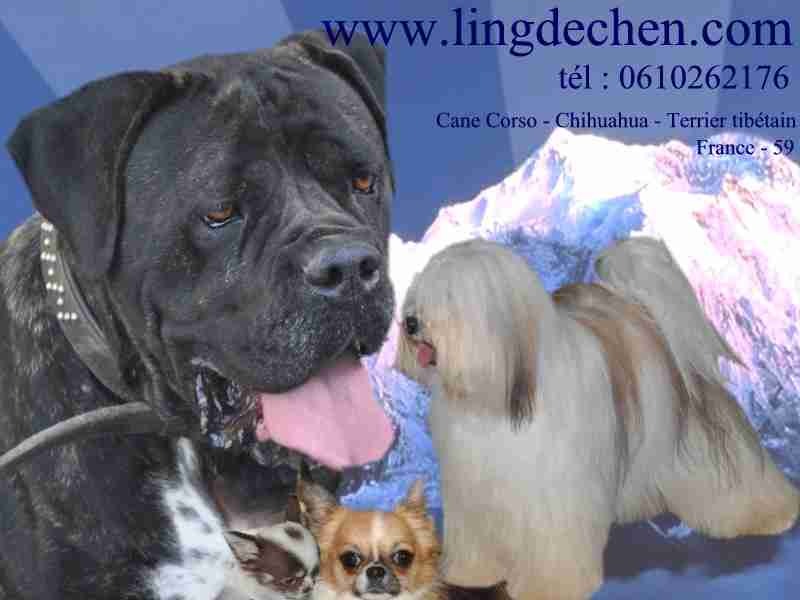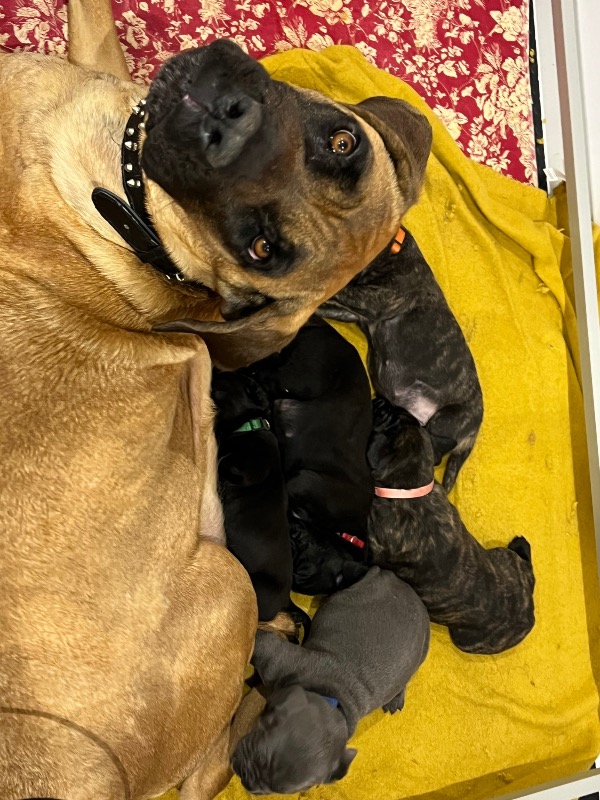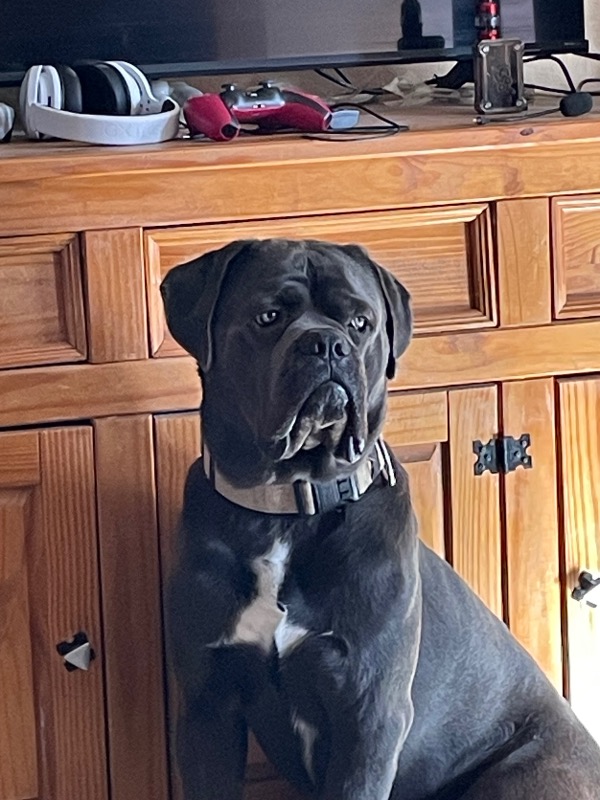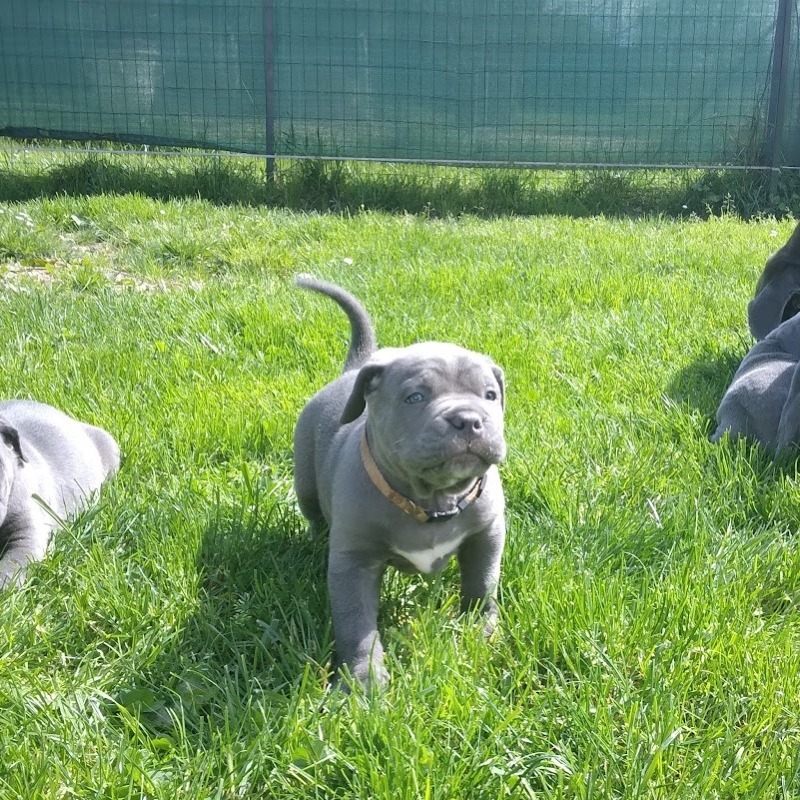Cane corso
Welcome to our page dedicated to the breed of dog cane corso!
Here, you will find all the useful information about cane corso. This descriptive profile will allow you to discover the aspects of this breed. You can notably consult information about the average price, monthly and annual upkeep expenses, their health, name ideas, as well as their official recognition by competent authorities.
Explore this page to discover everything you need to know.
Overall description of the breed
The Cane Corso is an integral part of Italian history, present for centuries in the peninsula, it was once the bodyguard of the Roman legions. Considered the protector of the population, it was present throughout Italy, mainly used as a guard and defence dog for the herds of cattle, its presence was indispensable in all the farms of the country.
Its direct ancestor is the "Canis Pugnax", a much larger and stronger dog than the Cane Corso we know today. Nowadays, it is still present in the south of the Italian peninsula, but the breed was on the verge of extinction in the middle of the 20th century, mainly because of the armed conflicts that arose during the Second World War.
Some breeders, determined to safeguard this genetic heritage, created the official Cane Corso club in the 1970s, in order to define a precise standard and promote the development of the breed on a European scale.
The Italian Book of Origins recognised the breed in 1979, but it would take more than 30 years for the International Cynological Federation to register it definitively. On 21 May 2007, the patronage of the breed was naturally attributed to Italy and the last update of the official standard in force was published on 13 November 2015.
The Cane Corso is a large, robust and hardy dog that requires very little maintenance and its resistant physique is not a fortune for vets. Complete and balanced, they are also excellent family dogs, with well-proportioned measurements, prominent muscles, a broad chest, a stocky back and well sprung ribs.
Its limbs are vigorous and its bone structure strong, its voluminous morphology makes it powerful and athletic. The head of the Cane Corso is broad and massive, with a rounded skull, short muzzle and a well defined stop. The coat is short, smooth and silky, with several colours permitted by the standard, such as black, grey, slate, fawn or brindle.
His reputation as an efficient guardian precedes him, his protective instinct is extremely developed, especially when it comes to defending his family members and in particular his children, whom he loves very much.
Devoted and loyal, they are close to their owners and will be eager to please them. Attentive to their environment and quick-tempered, their apparent tranquility can hide a remarkably reactive dog when they sense the slightest danger.
In spite of its imposing size, the Cane Corso will be discreet in the house, it appreciates cuddles, but without excess and will not stick to you all day long, it is a companion of life which supports well the solitude.
In short, the Cane Corso is a giant with a tender heart, particularly attached to his family, he will love them as much as he will protect them, with determination and benevolence.
As an adult, the Cane Corso will weigh approximately 44 to 50 kg (97 to 110 lbs) for males and 40 to 45 kg (88 to 99 lbs) for females, its height will be approximately 62 to 68 cm (24.5" to 26.5") for males and 58 to 64 cm (23" to 25 ") for females.
Awareness of acquiring an animal
Each animal is a sensitive being, deserving love, attention and care.
When you choose to adopt an animal, you take on the responsibility of ensuring its health and well-being throughout its life.
To learn more about animal welfare, we invite you to consult our FAQ by clicking the button below:
Origins
The Cane Corso is a dog breed originating from Italy, specifically from the region of Apulia. Its name comes from the Latin "Cohors", which means protector or guardian. Descendant of the Roman molossus, used as war dogs, the Cane Corso was developed to be a guard dog, hunting dog, and herd protector. Its ancestors were used for hunting big game and as war dogs by the Romans. This breed has preserved its qualities of protector and working dog over the centuries, while adapting to modern needs. Today, the Cane Corso is appreciated for its intelligence, loyalty, and protective abilities.
History
The history of the Cane Corso dates back to Antiquity, where its ancestors, the Roman molossi, were used as war and hunting dogs. After the fall of the Roman Empire, these dogs continued to be used by Italian farmers to protect their farms and livestock. Over the centuries, the Cane Corso was perfected to become a versatile working dog, capable of hunting, guarding, and protecting. The breed almost disappeared in the mid-20th century due to industrialization and the decline of traditional agricultural methods. Fortunately, thanks to the efforts of enthusiasts in the 1970s, the Cane Corso was saved and rebuilt. The breed was officially recognized by the Fédération Cynologique Internationale (FCI) in 1996.
Standard
The standard of the Cane Corso breed, as defined by the Fédération Cynologique Internationale (FCI), describes a large, robust, and elegant dog. The head is wide and massive, with a slightly dome-shaped skull and a square and powerful muzzle. The eyes are medium-sized, oval-shaped, and dark in color, showing an alert and intelligent expression. The ears are medium-sized, triangular, and can be cropped or left natural. The body is well-proportioned, muscular, and solid, with a wide and deep chest. The legs are straight and sturdy. The tail is thick at the base and tapers towards the end, carried high when in action. The coat is short, dense, and shiny, with a coat color that can be black, grey, fawn, brindle, or red.
Physical characteristics
The Cane Corso is a large, imposing and muscular dog, with a majestic and athletic appearance. Males measure between 62 and 70 cm at the withers and weigh between 45 and 50 kg, while females measure between 58 and 66 cm and weigh between 40 and 45 kg. Its coat is short, dense and shiny, providing effective protection against the weather. Accepted coat colors include black, gray, fawn, red, and brindle. The head is wide with a square and powerful muzzle, strong jaws and a black nose. The eyes are medium-sized, oval-shaped, and dark in color. The ears are naturally drooping but can be cropped for a triangular shape.
Character
The Cane Corso is known for its loyal, protective, and intelligent character. It is an extremely dedicated dog to its family, showing great affection and a willingness to please its masters. Its protective instinct is highly developed, making it an excellent guard dog. Although it can be reserved with strangers, it is generally calm and confident. The Cane Corso is also very intelligent and capable of learning quickly, making it responsive to training. It is important to socialize and train this dog from a young age to ensure balanced behavior. In the family, it is gentle and patient, especially with children, making it a reliable and loving companion.
Life expectancy
The Cane Corso has an average life expectancy of 10 to 12 years. To maximize its longevity, it is essential to provide a balanced diet, regular veterinary care, and an active lifestyle. Owners should be aware of common health problems in this breed, such as hip dysplasia, heart disease, and some eye issues. Regular veterinary check-ups can help detect and treat these conditions quickly. In addition, proper socialization and adequate exercise are crucial to maintain a Cane Corso's physical and mental health. With proper care, this sturdy dog can live a long and happy life, bringing joy and protection to its family for many years.
Exercise and activity needs
The Cane Corso is an active and energetic breed that requires a significant amount of exercise to stay healthy and happy. It is recommended to provide at least one to two hours of daily exercise, including long walks, runs, and interactive play sessions. Due to its intelligence and quick learning ability, the Cane Corso also benefits from mental stimulation, such as obedience training and puzzle games. Activities like agility and tracking can also be very beneficial for this breed. Regular exercise helps prevent boredom and destructive behaviors, ensuring a balanced and well-adjusted dog. The Cane Corso thrives in an environment where it can be active and mentally stimulated.
Recommended diet
The Cane Corso's diet must be balanced and tailored to its specific needs due to its large size and high activity level. A high-quality food, rich in proteins and essential nutrients, is recommended. Premium kibble specially formulated for large active breeds is ideal. An adult Cane Corso consumes on average between 500 and 700 grams of dry food per day, divided into two meals. The monthly cost of feeding varies between 60 and 100 euros, depending on the quality of the products chosen. It is crucial to monitor its weight and avoid overeating, as obesity can lead to various health problems. Dietary supplements may be considered to support joint and heart health, including omega-3 fatty acids and glucosamine.
Training and obedience
The Cane Corso is an intelligent and responsive breed, but its education and training require a firm and consistent approach. Starting training at a young age is essential to establish good habits and proper socialization. Positive reinforcement methods, such as treats rewards and praise, are particularly effective with this breed. Consistency and patience are the keys to success. Cane Corso respond well to basic commands like "sit," "come," "heel," and "stay." Early socialization with other dogs and various environments helps prevent undesirable behaviors. Obedience classes and activities like agility can also be beneficial to stimulate their active mind and strengthen the bond with their owner.
Behavior with children
The Cane Corso is often considered an excellent companion for children due to its protective, loyal, and patient nature. With proper socialization and training, it can be very gentle and tolerant with younger family members. Its protective nature makes it an excellent guardian, providing a reassuring and secure presence. However, due to its large size and strength, it is important to supervise interactions between young children and the dog to avoid unintentional accidents. Teaching children to respect the dog and interact with it appropriately is essential for harmonious coexistence. With proper socialization, the Cane Corso can become a loyal and loving companion for children of all ages.
Compatibility with Other Animals
The Cane Corso can live with other pets, but it often requires early socialization and gradual introduction. Well-socialized Cane Corsos from a young age generally get along well with other dogs and even cats. It is important to monitor the initial interactions to ensure they go smoothly and to encourage positive experiences. Cane Corsos may sometimes show dominance instincts, but with proper training and ongoing socialization, they can peacefully coexist with other animals. The key is to promote positive interactions and reinforce good behaviors to ensure peaceful cohabitation.
Grooming needs
The Cane Corso has a short, dense and shiny coat that requires relatively little grooming. Weekly brushing is sufficient to remove dead hair and maintain the shine of its coat. During shedding seasons, in spring and autumn, brushing should be intensified to manage excess hair. Baths are only necessary occasionally, or when the dog is particularly dirty, using a mild shampoo suitable for dogs. Ears should be checked and cleaned regularly to prevent infections, and teeth should be brushed frequently to avoid dental problems. Nails should be trimmed regularly to prevent injuries. Regular grooming helps to quickly detect skin problems or other anomalies, thus contributing to the overall health and well-being of the Cane Corso.
Health
The Cane Corso is generally a robust breed, but is prone to certain hereditary health conditions. Common health problems include hip and elbow dysplasia, heart diseases, and some eye issues such as entropion. It is crucial to choose a reputable breeder who tests their dogs for these conditions to minimize risks. A balanced diet, regular exercise, and periodic veterinary visits are essential to maintain their health. Cane Corso may also be prone to joint problems, requiring special attention to their diet and exercise level. Regular veterinary check-ups help detect and treat these conditions quickly, contributing to a long and healthy life for the dog.
Average price
The price of a Cane Corso can vary considerably depending on several factors, such as the lineage, pedigree, breeder's reputation, and geographic location. Generally, the average price for a Cane Corso puppy is between 1,200 and 2,500 euros. Specimens from champion bloodlines or with exceptional characteristics can cost much more, sometimes up to 3,000 euros or more. It is essential to choose a reputable breeder who adheres to health and animal welfare standards. Although this may mean paying a higher price, it often ensures a healthy and well-socialized puppy. Future owners should also budget for additional expenses for veterinary care, food, accessories, and training.
Expenses
Monthly expenses for a Cane Corso can vary depending on several factors, including food, veterinary care, grooming, and accessories. On average, owners can expect to spend between 80 and 150 euros per month. Quality food, tailored to the specific needs of the breed, costs around 50 to 80 euros per month. Regular veterinary care, including vaccinations and parasite treatments, can add 20 to 30 euros per month. Grooming, although minimal, can cost 10 to 20 euros per month if done by a professional. Toys, treats, and other accessories can add an additional 10 to 20 euros. These costs can vary depending on each dog's specific needs and the owner's choices.
Name ideas
Choosing a name for your Cane Corso can be a fun and exciting task. Here are some name suggestions that could suit the personality and majestic appearance of this breed: Max, Luna, Rocky, Bella, Zeus, Daisy, Charlie, Maya, Rex, Ruby, Thor, Nala, Bruno, Athena, Oscar, Zara, Milo, Sadie, Ginger, Toby. When choosing a name, it is important to consider its pronunciation and make sure it does not sound too much like basic commands to avoid any confusion during training. Take the time to observe your dog and choose a name that reflects their unique personality and strong, majestic appearance.
Legislation and regulation
In France, the Cane Corso is not classified as a dangerous breed and is therefore not subject to specific restrictions. Owners must comply with general regulations regarding dog ownership, including microchipping or tattooing for identification and up-to-date vaccination. It is also recommended to take out liability insurance to cover any potential damages caused by their dog. When traveling abroad, it is crucial to check the specific requirements of the destination country regarding health certificates and vaccinations. Always inquire about local and national laws to avoid any legal issues and ensure a harmonious coexistence with the Cane Corso.
Official recognition
The Cane Corso is recognized by several cynological organizations around the world. In France, it is recognized by the Société Centrale Canine (SCC). Internationally, it is recognized by the Fédération Cynologique Internationale (FCI), the American Kennel Club (AKC) in the United States, and the Kennel Club (KC) in the United Kingdom. These organizations define the breed standards and organize dog shows where Cane Corsos can be presented and evaluated. Recognition by these organizations also ensures that breeders adhere to health, temperament, and conformation standards, contributing to the preservation and improvement of the breed. Pedigrees issued by these organizations guarantee the purity and quality of the bloodlines.
Pedigrees
Cane Corsos can obtain pedigrees recognized by various breed clubs around the world, ensuring their pure lineage and conformity to breed standards. In France, the Société Centrale Canine (SCC) issues pedigrees. In the United States, the American Kennel Club (AKC) offers pedigrees for Cane Corsos. In the United Kingdom, the Kennel Club (KC) also issues pedigrees for this breed. Other organizations such as the Fédération Cynologique Internationale (FCI) and the United Kennel Club (UKC) recognize and issue pedigrees for Cane Corsos. These organizations verify the dogs' origins and certify that they meet breed criteria, ensuring the quality and purity of the bloodlines.
Destination and usage
The Cane Corso is a versatile breed primarily bred as a guard and protection dog. Thanks to its intelligence, strength, and courage, it excels in various functions, including as a guard dog, protection dog, police dog, and search and rescue dog. The Cane Corso is also an excellent family companion dog, appreciated for its loyalty and affection. Due to its balanced temperament and desire to please, it often participates in canine sports competitions such as agility, obedience, and tracking. Some Cane Corsos are also used as therapy dogs due to their calm and tolerant nature, bringing comfort and joy to people in hospitals and nursing homes.
Prohibitions
In France, the Cane Corso is not part of the breeds of dogs subject to specific prohibitions or classified as dangerous. However, it is essential to comply with the general regulations regarding dog ownership, especially in terms of identification, vaccination, and compliance with local laws concerning pets. In some countries, regulations may vary, and it is crucial to inquire about local and national laws, especially when traveling or moving, to avoid any violation. For example, some countries may have specific requirements regarding the importation of dogs, including health certificates and quarantines. Always check the current regulations to ensure a harmonious and legal coexistence with your Cane Corso.
Breeders of Cane corso
Want to see more breeders of Cane corso?
Check out the page of our directory listing all breeders of Cane corsoClassified Ads of Cane corso
Breed clubs of cane corso
No of cane corso breed clubs are currently registered on Preeders.
If you would like to highlight your breed club, sign up for free now and be the first to appear on this page.

